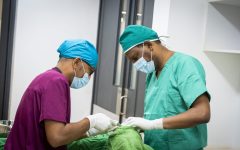Alumnus Spearheads Efforts for Equitable, Safe Surgical, Obstetrical, and Anesthesia Care in Rwanda and Beyond
April 15, 2024 2024-04-15 10:15Alumnus Spearheads Efforts for Equitable, Safe Surgical, Obstetrical, and Anesthesia Care in Rwanda and Beyond
Alumnus Spearheads Efforts for Equitable, Safe Surgical, Obstetrical, and Anesthesia Care in Rwanda and Beyond
An award-winning anesthesiologist, researcher, global health leader and advocate for health equity and social justice, UGHE Alum Dr. Eugene Tuyishime is passionately working to improve access to safe anesthesia, surgery, and obstetric care within Rwanda and other low- and middle-income countries especially in Sub Saharan Africa.
Dr. Eugene, recently received the World Federation of Societies of Anaesthesiologists (WFSA) Rising Star Award in recognition for his contributions to safe anesthesia and resuscitation practice in Rwanda during the 18th World Congress of Anaesthesiologists (WCA) held in Singapore early March, 2024.
A Robust Foundation for Impactful Journey

Eugene’s impact commenced when he pursued the Master of Global Health Delivery from the University of Global Health Equity in 2017. The practical skills acquired from the MGHD laid the foundation of his impactful career of leadership and innovation in health care.
At UGHE, he received a robust foundation in health sciences, vital skills in health system leadership and management, and the ability to analyze social determinants of health in rural environments. Most importantly, he gained the passion to become an advocate and an active participant in the advancement of UGHE’s equity agenda.
“Through the exceptional training I received from UGHE, I was molded into a leader, changemaker, and co-founder of impactful initiatives aimed at advancing global health equity. I am grateful to this prestigious institution,” he says.
Upon graduation, Eugene had the opportunity to extend the acquired skills as a faculty member in anesthesiology at the University of Rwanda, where he trained medical students and residents in research, global health, perioperative medicine, and passed on the best practices of equitable healthcare he gained at UGHE.
Towards becoming a changemaker globally, he participated in sub-specialty fellowships in simulation and perioperative medicine at Ohio Health in the USA and the University of Toronto in Canada. He is currently an Obstetric Anesthesia Fellow at Western University since 2023.
Breaking Disparities in Surgical Care

Driven by the staggering disparity in access to safe surgical, obstetrical, and anesthesia care affecting over 5 billion individuals globally, Dr. Eugene is resolute in tackling this challenge. His passion for addressing these inequities led to the co-founding of the Initiative for Medical Equity and Global Health (IMEGH).
He explains his work, “I organize different continuous professional development (CPD) courses for anesthesia providers and other healthcare providers working in rural and small hospitals across Rwanda impacting better quality of care for patients from rural areas.’
Through IMEGH, he has been instrumental empowering healthcare providers in rural areas to provide quality care to the underserved populations and made anesthesia a desirable specialty option for medical students in Rwanda.
“I saw the challenge that in Rwanda, anesthesia was not popular specialty among medical students due to high levels of stress, insufficient mentorship, and poor job opportunities. Through the IMGEH, I focused on efforts to encourage more medical students to join the specialty with the goal to make a positive impact on surgical and maternal outcomes.”
He points out that “more efforts and investments are needed to make anesthesia more attractive to young doctors” to improve the quality of anesthesia care and patients’ outcomes.
Eugene’s impact reverberates through his contributions to policy development and activism. As co-chair of the team that developed Rwanda’s first standards of safe anesthesia practice, he has catalyzed a paradigm shift in anesthesia care, ensuring universal adherence to quality protocols as an addition to his previous work on early identification and management of high risk obstetric and surgical patients across the country.
He reflects on his extensive advocacy efforts, “I have written multiple advocacy papers such as on training challenges for anesthesiologists and policy briefs for example on quality of maternal care in district hospitals to make a positive impact towards safer perioperative care in Rwanda and other low resources settings.”
His application of skills honed at UGHE, including negotiation and strategic planning, has been instrumental in these endeavors.

His leadership extends to international influence, where he serves as a member of the World Federation Society of Anesthesiologist (WFSA) workforce wellbeing and education committees. Through advocacy and awareness campaigns, he champions the cause of healthcare workforce wellbeing, particularly in low-resource settings, amplifying the voices of those often overlooked in health care delivery.
As an author of various articles, he has provided insightful recommendations on burnout among anesthesia providers in Rwanda and East Africa. He explains, “anesthesia providers, particularly those from low-resource settings, require improved training opportunities and higher quality working conditions while enhancing their well-being, consequently leading to improved health outcomes for the patients they serve.”
Recognized for his exemplary contributions, Dr. Tuyishime has received numerous accolades, including the renowned WFSA Rising Star Award and the Shields Day awards for best presentation and quality improvement at the University of Toronto. The WFSA Rising Star award reflects his dedication to safe anesthesia and resuscitation practice that has not only saved lives but also empowered healthcare providers across diverse settings through training and capacity-building initiatives.
“I felt incredibly honoured and deeply humbled to receive such a prestigious and global academic award recognizing my work in anesthesiology and global health. This award reinforces my commitment to advancing equitable access to safe anesthesia in low-resource settings with a focus on Sub-Saharan Africa,” Eugene reflects on his award.
Championing a Future of Equitable Healthcare
Looking to the future, Eugene envisions a world where equitable access to high-quality healthcare is the norm. His efforts align with the Rwanda government’s vision to reduce maternal mortality rates to below 70/100,000 live births by 2030, emphasizing the pivotal role of obstetric anesthesia in achieving this goal. His unwavering commitment to improving health outcomes underscores his passion for collective action and innovation.
“Through collaborations and partnerships, I aspire to establish global health centers, advocate for policy reforms, and drive sustainable change in healthcare systems in my country and beyond,” he commits with determination.
In essence, Dr. Eugene Tuyishime embodies the ethos of a change-maker, a trait he shares with over 200 alumni of UGHE’s MGHD program. These individuals are now steadfastly committed to promoting equity and justice in healthcare within their respective domains, serving as leaders, advocates, advisors, academics, healthcare professionals, policymakers, and more.
In Rwanda,, surgery constitutes an essential aspect of studies and training at UGHE – a PIH initiative inaugurated in northern Rwanda in 2015. Students enrolled in the 6.5-year medical program attain bachelor’s degrees in medicine and surgery alongside a master’s degree in global health delivery. Recently, the MGHD program has incorporated the Global Surgery Option into its array of tracks. This rigorous curriculum entails instruction from distinguished surgeons who possess extensive experience across diverse healthcare landscapes.
Partners In Health spearheads efforts to ensure the provision of quality anesthesia and surgical care while concurrently endeavoring to train the next generation of surgeons. Across various nations, diverse programs are deployed to facilitate surgical mentorships, residencies, and advanced educational opportunities for local physicians. For instance, initiatives like the Paul Farmer Global Surgery Fellowship and the Global Health Equity Residency impart crucial skills to surgeons on delivering care in resource-limited settings, with the overarching objective of nurturing surgical researchers and policy advocates.







